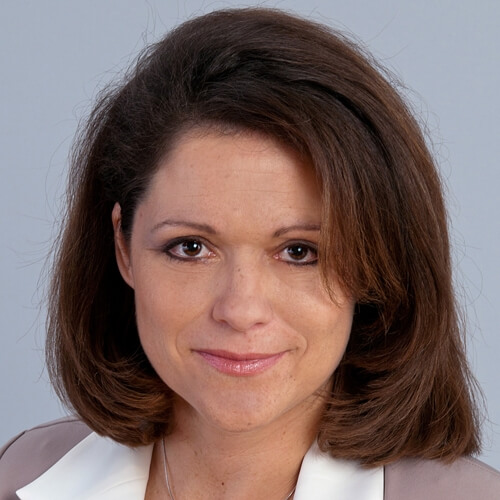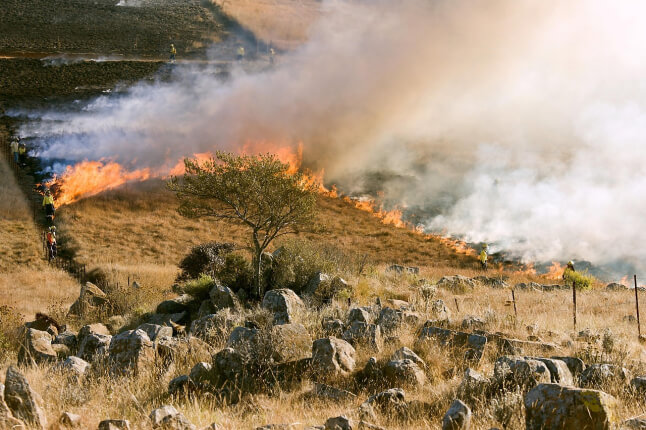News
Martha Heitzmann '97 (Ph.D.), Senior Executive Vice President of Research and Innovation at Areva Group.
Martha Heitzmann ’97 (Ph.D.) is the Senior Executive Vice President of Research and Innovation at Areva Group, a French energy company that specializes in nuclear power.
She describes herself as a “hybrid” of cultures and disciplines, “a dedicated environmentalist who is pursuing a career in heavy industry.”
Heitzmann earned a B.S. in Ecology and Evolutionary Biology at the University of Arizona. After serving as an environmental policy intern for then-Senator Al Gore, she moved to the Marshall Islands at age 22 to help build up an Environmental Protection Authority.
During her two years in the Pacific region (including a year working with the Asian Development Bank), she developed a new interest in finding technologies and economic strategies that would permit the sustainable use of natural resources.
That interest brought her to Harvard, where she earned a Ph.D. in Environmental and Chemical Engineering. While here, she met her husband, who is French, and they now live in France with their three children.
Prior to joining Areva, Heitzmann has held positions with the World Bank, the Organisation for Economic Co-operation and Development, Suez Environnement, and Air Liquide.
To read a longer biography of Heitzmann that was recently published in the French newspaper Les Echos (in French), click here.
How did completing your graduate work at Harvard prepare you for success in your engineering career?
I felt pushed intellectually, physically, and psychologically. I learned to use my strengths to create leverage on complex problems, and to compensate for my weaknesses by working in a team with colleagues.
One of my professors used to say, “After you do Harvard, everything else you do in life will be easier.” I remember thinking that this sounded like arrogant rubbish, but I have to say, I’ve found it to be more or less true!
Over the course of your career, you’ve had experience in both the public sector and the private sector. How has this breadth of experience given you a unique perspective and tool set?
The common thread (or fil conducteur, as the French would say) of my career is the environment. If you look at what I have worked on, you see that my career reflects my conviction that civil society, public institutions, and industry all have an active role to play in sustainable development.
The fact that I have lived and worked in some of the world’s richest and poorest countries helps me understand rather quickly why people have different views on critical natural resources management issues. My experiences can give me helpful insights into how a deal might be brokered, or how a problem can be reframed so that the major actors can find some alignment and thus progress together.
What would you say is the most pressing environmental problem today?
Energy. How can we assure an environmentally sustainable supply of electricity to meet the needs of the growing world population? How can we sustain a high quality of life using less energy? What tradeoffs are we ready to accept?
As Senior Executive Vice President, what problems are you helping Areva to tackle?
Areva’s mission is to provide technologies for supplying CO2-free electricity. Our historic roots are in nuclear power, where the group is a world leader, and in the past decade Areva has begun developing a portfolio of technologies that generate electricity from renewable resources.
My responsibilities include overseeing the Group’s portfolio of R&D projects and patents. This includes making sure that we are developing and protecting technologies—including wind and solar thermal—that will secure the Group’s long-term future.
I am also helping Areva manage and develop its population of technical experts, for the same reason. Since our investment cycles are very long, technology development strategies have to be built to last.
You’re a successful leader in engineering and business, and you’re also a mother of three. How are you able to balance work and family life?
Living in France has made it easier for me to pursue an executive career at the same time as having a family.
Between the state-subsidized and regulated daycare system, the tax credits for household help, and the wonderful tradition of the French grandmother, my husband and I were really blessed. Also, in France, it is socially acceptable (and maybe even expected) that a mother of young children continues to work.
Has gender ever been an issue for you, in your career?
At the beginning of my career, I sometimes sensed cannibalistic instincts from some of the older women I encountered in the workplace. Many of them had foregone having a family, and maybe they regretted the fact that younger women no longer seemed obliged to make this choice. At any rate, I think that women have now begun to develop a solidarity which is palpable and reassuring in the workplace.
Companies also increasingly value diversity. I feel as though a lot of doors have opened for me because I was a woman who also had a Ph.D. in engineering from Harvard and an interesting international perspective. There are conscious efforts to try to integrate women into the highest levels of decision making.
Through the European Professional Women’s Network, we have also created mentoring programs to help develop women executives.
What advice would you give a Harvard engineering student today?
I would advise her to stick with her choice through thick and thin. It’s sometimes a bumpy ride, but it is worth it. Being an engineer is wonderful, if you like to solve problems, to make a tangible, measurable difference. If you are pragmatic and results-oriented, it is a great career choice.
I would also advise students to work for a couple of years between undergraduate and graduate school. Real, on-the-job experience helps you know what really matters to you. It’s better to know this before you start graduate studies.
What memory stands out the most from your time at Harvard?
Initially, I had a lot of trouble adapting to the winter weather. I grew up in Arizona and had never owned a winter coat before I moved to Cambridge.
The first winter that I was there, I kept asking a colleague who had done his Master’s in Ithaca, NY, how much longer the winter was going to last. I started asking him this in mid-November.
Each time, he did a lot of gesticulating, counting on his fingers, scratching his head, and then came up with the answer, “Ohhh, about three more weeks.”
At some point, I realized that he was putting me on. But it had by then become a ritual, so we carried on pretending!
Topics: Environment
Cutting-edge science delivered direct to your inbox.
Join the Harvard SEAS mailing list.



